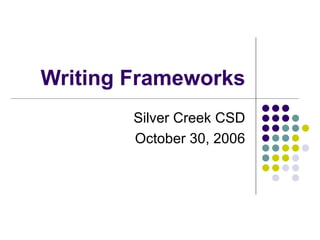Writing Frameworks
•
10 likes•1,360 views
Workshop presentation in Silver Creek, NY - Fall 2006
Report
Share
Report
Share

More Related Content
What's hot
What's hot (20)
Media relations 101 primer for nonprofits and community groups. Turning worth...

Media relations 101 primer for nonprofits and community groups. Turning worth...
Similar to Writing Frameworks
Hungry for Words: Clarifying Voice & Story, a Writing Class by Best-Selling A...

Hungry for Words: Clarifying Voice & Story, a Writing Class by Best-Selling A...The International Food Blogger Conference
Similar to Writing Frameworks (20)
Discussion a interview yourself—or, better yet, have someone inte

Discussion a interview yourself—or, better yet, have someone inte
Hungry for Words: Clarifying Voice & Story, a Writing Class by Best-Selling A...

Hungry for Words: Clarifying Voice & Story, a Writing Class by Best-Selling A...
Writing For Acceptance in Abstracts, Posters & Presentations

Writing For Acceptance in Abstracts, Posters & Presentations
Descriptive Essay RequirementsDescriptive Essay (4-5 paragraphs; .docx

Descriptive Essay RequirementsDescriptive Essay (4-5 paragraphs; .docx
More from TGray
More from TGray (7)
Recently uploaded
Mehran University Newsletter Vol-X, Issue-I, 2024

Mehran University Newsletter Vol-X, Issue-I, 2024Mehran University of Engineering & Technology, Jamshoro
Recently uploaded (20)
General Principles of Intellectual Property: Concepts of Intellectual Proper...

General Principles of Intellectual Property: Concepts of Intellectual Proper...
Salient Features of India constitution especially power and functions

Salient Features of India constitution especially power and functions
Unit-V; Pricing (Pharma Marketing Management).pptx

Unit-V; Pricing (Pharma Marketing Management).pptx
UGC NET Paper 1 Mathematical Reasoning & Aptitude.pdf

UGC NET Paper 1 Mathematical Reasoning & Aptitude.pdf
Basic Civil Engineering first year Notes- Chapter 4 Building.pptx

Basic Civil Engineering first year Notes- Chapter 4 Building.pptx
Mixin Classes in Odoo 17 How to Extend Models Using Mixin Classes

Mixin Classes in Odoo 17 How to Extend Models Using Mixin Classes
ICT role in 21st century education and it's challenges.

ICT role in 21st century education and it's challenges.
Writing Frameworks
- 1. Writing Frameworks Silver Creek CSD October 30, 2006
- 3. What is “good” writing?
- 4. Rubric Compare NYS ELA Rubric 6 + 1 Traits Rubric Step Up to Writing Rubric Your thoughts on “good” writing…
- 5. “ This I Believe…” "Never has the need for personal philosophies of this kind been so urgent.“ - Edward R. Murrow
- 8. How are we doing? Conventions Sentence Fluency Word Choice Voice Organization Ideas X X X X X X X X X X X X X X X X X X X
- 11. Good Excuses!
- 24. Writing Frameworks Silver Creek CSD October 30, 2006
- 26. Organization
- 30. Introductions
- 41. Conclusions
- 44. HEARING VOICES!
- 49. Photo by Dorothea Lange (1936)
- 52. DUST!
- 53. The Most Boring Topic Ever! Think of a topic that does not interest you at all and that if asked to write about it – you would run shrieking from the room, never to return.
- 58. The Most Incredible Knife: An 85 blade Swiss Army-style knife from Wenger.
- 61. CLARITY IS THE GOAL! “Wise words in the mouth of fools do oft themselves belie.”
- 62. I go out walking……
- 63. Phil WENT down the road.
- 64. Sentence Fluency
- 72. Conventions
- 75. Making a Plan